Going Band for Band with Sectionalism: Early Christians still aren't "Ancient Black Lives Matter".
On my 2nd most recent post (link), Sectionalism orated a long and well written comment to his assistant Liam Alexander. I’ll be replying to most of it here because it was well-constructed and showcases most of the pagan qualms with how New Testament Christianity formed and spread. In my opinion, the original post was sufficient but many people came away with the opposite conclusion as the post, which I find silly. Additionally, Sect represents most of my intellectual Opps so I will be attempting to smoke his ass in 4k.
We’ll be going blow for blow, pound for pound, dolla foe dolla.
Now..
Knowledge spread NOW.

Sect: “Human sacrifice, like other forms of sacrifice, is ritualized slaughter and among the Indo-Europeans was generally performed on criminals, was captives, homosexuals, and other disreputable people. Also, it was not common, it was an extraordinary religious activity. I don’t see why you think it is significantly worse than certain practices Christians did like burning people at the stake.”
Compared to the total population of Christians, burning at the stake was far less frequent than human sacrifices. The death toll for the Spanish inquisition, for example, was like 250 people over the course of centuries.
Also, while I think it’s a bad idea and representation of a “religion of love”, they were doing so as punishment for a crime and really, defense of their community- not as an act of worship. Also, the Catholic Church never staked anyone, they gave the convicted criminal over to the state to be punished. This is what made the “blots” of pagan past so disgusting, that it entertained a deity who wanted the guts of war captives and whoever else mixed in a giant bowl and smeared all over the walls. How is it a leap to say that such an entity is demonic? How does the number of white people following this entity make it more or less demonic? Again, this is all predicated on whether Christianity is factually true or not. Why should people who believe it is factually true not follow their religion to its natural conclusions? Because the people worshipping demons are white? Should the Germans have spared the Bolshevik conscripts on grounds that they were white? Most of them, anyway.
Sect: Okay, so Early Christians WERE the ancient BLM, it’s just that you don’t believe in the core beliefs of BLM but do believe in the core beliefs of Christianity. Destroying works of art that they associated with an unwholesome past that had to be buried. Alienating people from their demon-worshipping ancestors. Also, defacing art is in some ways worse than destroying it entirely, because it is an act of deliberate mutilation. Pagans, who had no value placed on the crucifix, melted it down for gold and other materials, not to pwn the Christcucks. When a Christian bashes the nose off of Augustus or etches a crucifix into his skull, he is telling the whole world that Caesar lost, and Christ won.
I don’t really know how people came away from my textwall saying that I somehow “admitted” they were BLM. In fact, I demonstrated how the Early New Testament Christians were model citizens of the Empire in many ways. For example, Paul tells the Early Churches to keep paying their taxes to the people that use that money to hunt them down and martyr them. BLM doesn’t “endure martyrdom”, it inflicts martyrdom. The problem here is the definition. What does it mean to be “BLM”? This is why I asked the rhetorical question about the Nazis being BLM: the only qualifier seems to be breaking shit someone older than you made. Well, everyone ever has always done that. I don’t accept this view of history that states axiomatically that older = better (although it certainly trends that way as a general principle) so I don’t believe in this king of the hill style flag planting where once someone does anything its off limits for all time. Of course, this logic doesn’t hold up in the pagan defense of colonialism or other forms of aggression where the new wipes out the old. It also doesn’t jive with one of the most common gotchas used on Native American apologists: that the “indigenous” are only so because they brutally slaughtered the people that occupied the land before them. The same can be said of paganism being supplanted by Christianity
Sect: Destroying works of art that they associated with an unwholesome past that had to be buried.
This is where I see the seeds of “this is why I think Christianity is anti-white” being planted. I don’t like this style of generalization, that Christians merely believe everyone everywhere was always bad (unwholesome) until Jesus shows up and saves the day. Not Catholic, but I really like what Pope John Paul II said about “rays of sunshine” being in other religions. As we will see, Christians typically had a great tolerance and even admiration for their pre-Christian ancestors. The mental image of a mob of poor, dysgenic losers forming a rabble that sweeps across the Empire destroying its heritage in one fell swoop is just factually wrong. So is the idea that the “past had to be buried”. Akthually, it was Christians who preserved the pre-Christian past, often from other pagans.
Pointing at individual statues that were partially defaced (typically with good reason to do so) and ignoring the many tens of thousands of completely intact relics is sort of a self-pwning. Again, I will get to how Early New Testament Christians were not in the business of liquifying their pre-Christian past.
I admire certain things about pre-Christian folk religions. However, I definitely do not believe that pre-Christian whites (or whites as a group) can do no wrong. They were as capable of making mistakes and not being instantly, eternally perfect as anyone else. Yes, there are traits that make whites special. No, they don’t amount to an excuse for a double standard. It’s not anti-white to say that, its pro-reality.
This is the problem with zooming out on whites until they become an abstract sports team of sorts that can do no wrong.
Sect: Also, defacing art is in some ways worse than destroying it entirely, because it is an act of deliberate mutilation. Pagans, who had no value placed on the crucifix, melted it down for gold and other materials, not to pwn the Christcucks.
Idk what this means. Isn’t melting a statue down or whatever also an act of deliberate mutilation? Also, take a look at this:
Defaced Early Christian art. Is it self defense when pagans do it (to other whites), but anti-white hatred when Christians do it? Remember, effectively nothing survives from the pre-Constantine era. This is the pot calling the kettle black, imo. The difference is, Pagans were far better at mass-destruction of sacred artwork than Christians even attempted to be.
Also, I think melting down crucifixes is more about how agnostic Scandinavians of the time were in general. Much like the Roman Imperial cult, or the various pantheons, they didn’t really inspire a praxis in followers. Scandinavians of the time typically “worshipped” their pantheon the way we “venerate” the Founding Fathers. They’re interesting myths that highlight the truths of our culture, but it’s not like we really think George Washington is looking down on us from the clouds….
Oh.
There was extremely little zealotry in pre-Christian folk religions, that’s like asking someone to be zealous of the fact that they’re Bangladeshi. Sure, there’s patriotism, but I’m talking about zealousness. As in, willing to cut the throat of anyone who talks down on Bangladesh. There’s some people like that, but most people just don’t live their lives like that. America has a touch of this, but that’s why it was called a civic religion.
I think this bears repeating: Ancient people shrimply did not have the same view of art as we do. The idea of preserving old stuff (including entire religions, btw) for the sake of being old was foreign to them, pre-Christian Europeans included. I mean, these are the people pagans praise for destroying other cultures. Do you think the Scythians opened roadside museums for every people they exterminated to the man? Lol
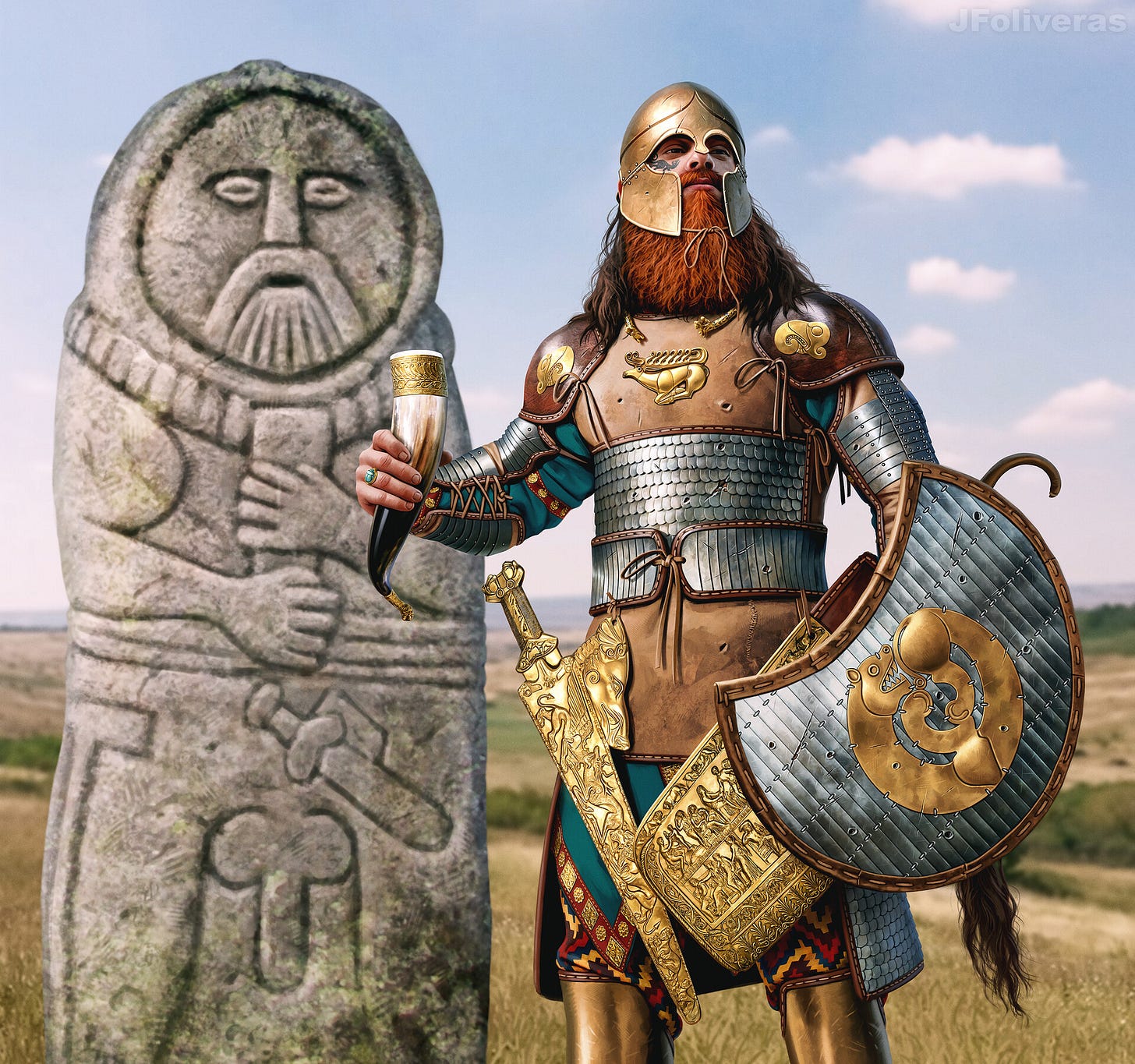
When a Christian bashes the nose off of Augustus or etches a crucifix into his skull, he is telling the whole world that Caesar lost, and Christ won.
I mean, perbraaps. It depends on the individual situation, many of which are lost to time. Like I said, Early Christians were often tortured and executed in front of pagan artwork, specifically statues of Roman emperors. The memory of the cartoonish acts of cruelty that occurred under these pieces is reason enough to destroy them, religion aside. The alternative is silly: leaving out the relics of the people that were just “conquered” despite the atrocities committed in their image because… they’re statues of whites or something? And when New Testament Christians compromised by marking them instead of completely destroying them, well that is actually somehow worse. Idk how. So yeah, it’s just not correct to say that there was this wave of juicing every piece of art Christians got their hands on in a fit of piety, the circumstances were often individual to the specific region/city/building.
Sect: > The art is symbolic of the mistreatment of Christians
Yes, and the statues of Columbus and Robert E. Lee and now Thomas Jefferson are symbolic of the mistreatment towards BIPOCs. You are literally explaining exactly why Christians were like the ancient BLM, and titling this the contrary.
Methinks this goes back to the people today who say that the first group to violently protest is automatically wrong. Hell nah. Violent protest is always permissible when conditions reach a certain point. This is another area where I believe Pagans maintain a special-pleading double standard. Were ancient Pagans in Christian Empires BLM when they destroyed Christian artwork? Was Emperor Julian “The Apostate” BLM? Not to them, he is lionized as this last thrust of European spirituality. Bro made a point of decimating Christian cultural media whenever he got the chance. Julian specifically makes pagans look really bad, honestly. He was in power for like, 2 years, and straddled the line of outright genocide as much as he could get away with.
Anyway, morality is not a binary of “Did you destroy statues y/n?”. It’s also not a binary of “were you violent y/n?”. The Sons of Liberty, for example, did some heinous things to British loyalists.
Calling Early New Testament Christians BLM because they (occasionally) destroyed statues is like calling Adolf Hitler BLM because he and George Floyd both had 10 toes. There is simply more to the story.
Sometimes, destroying artwork is a valid form of triumph (How vitalist!) or protest. Sometimes, its not. This is something Sect acknowledges when he writes, “Also, this isn’t about the sanctity of art. I’m not the Pearl-clutching type over destroying artwork, it’s the motives behind it”. I agree!
In the case of the Early New Testament Christians, the only thing they were doing that the Romans didn’t like was proselytizing. Yes, they did so aggressively. They also had some customs that they didn’t like. Like I said, the Romans thought the early New Testament Christians were graverobbers and cannibals. But they were “annoying” to the establishment instead of the way that BLM is “dangerous” to our civilization. As in, if they’d been left alone, they wouldn’t have inflicted the same carnage or damage that the pagan Romans tried to inflict on them.
Sect: It would make sense for someone to want to destroy the martyrs of foreigners like Trayvon Martin, but to want to destroy the statues of the virtuous emperors and heroes of your ancestors is clearly a product of subversion.
It’s not “subversion” because that’s not why they were destroying them, as demonstrated above and in the OP. Here, some more “Christianity is anti-White” language is starting to creep in. When a new faction came to power in the Ancient world, they started by “cleaning house” on the vanquished. As in, wiping their memory out from history. Ironically, early New Testament Christians were the exception that proves the rule. They destroyed, idk, like 15% of what they could? I have no way of proving that number, but it feels right. You’ll see why below.
To me, this is like Native Americans whining about getting debatably the best deal in human history out of getting conquered. Like, of all the conquered peoples in history, the Native Americans got the best lot. They get paid by their conquerors with ceded land and legal rights and other privileges. Well, Pagans aren’t too far off from this mark. By the terms of the Ancient world, they got a very good deal. An even better deal when considering that if they’d won, there would likely have been an extermination of Christians empire-wide. They tried that multiple times btw.
Either you must conclude that, or that Christians actually recognized themselves as a foreign para-society which writhed its way into the dying imperial core.
There’s language here which is trying to paint a picture that doesn’t exist. There was no “writhing”, there was the performance of miracles and a clearly different life which many people of the time wanted. In fact, Christians were some of the only authentically “spiritual” people in the entire Empire. People willingly converted. Sometimes, after witnessing great miracles. Sometimes, after being rationally convinced. Sometimes, after just seeing how much better a life the Christians were living (when they weren’t being Christobunga’d). Later, there was political pressure, but not so much in the early Church. In fact, many date the end of the Early Church to the moment where Christians began to dominate in society. Certainly, there was very little “writhing into power” like the anti-Christians wish there was. The idea that Early Christianity was like Grima Wormtongue whispering into the ear of the decrepit king is so silly and backwards.
Funny example: St. Katherine of Alexandria is remembered for winning a 50v1 debate against the best Imperial (pagan) philosophers who were so butthurt after blowing their lead that they sperged out and had her executed:
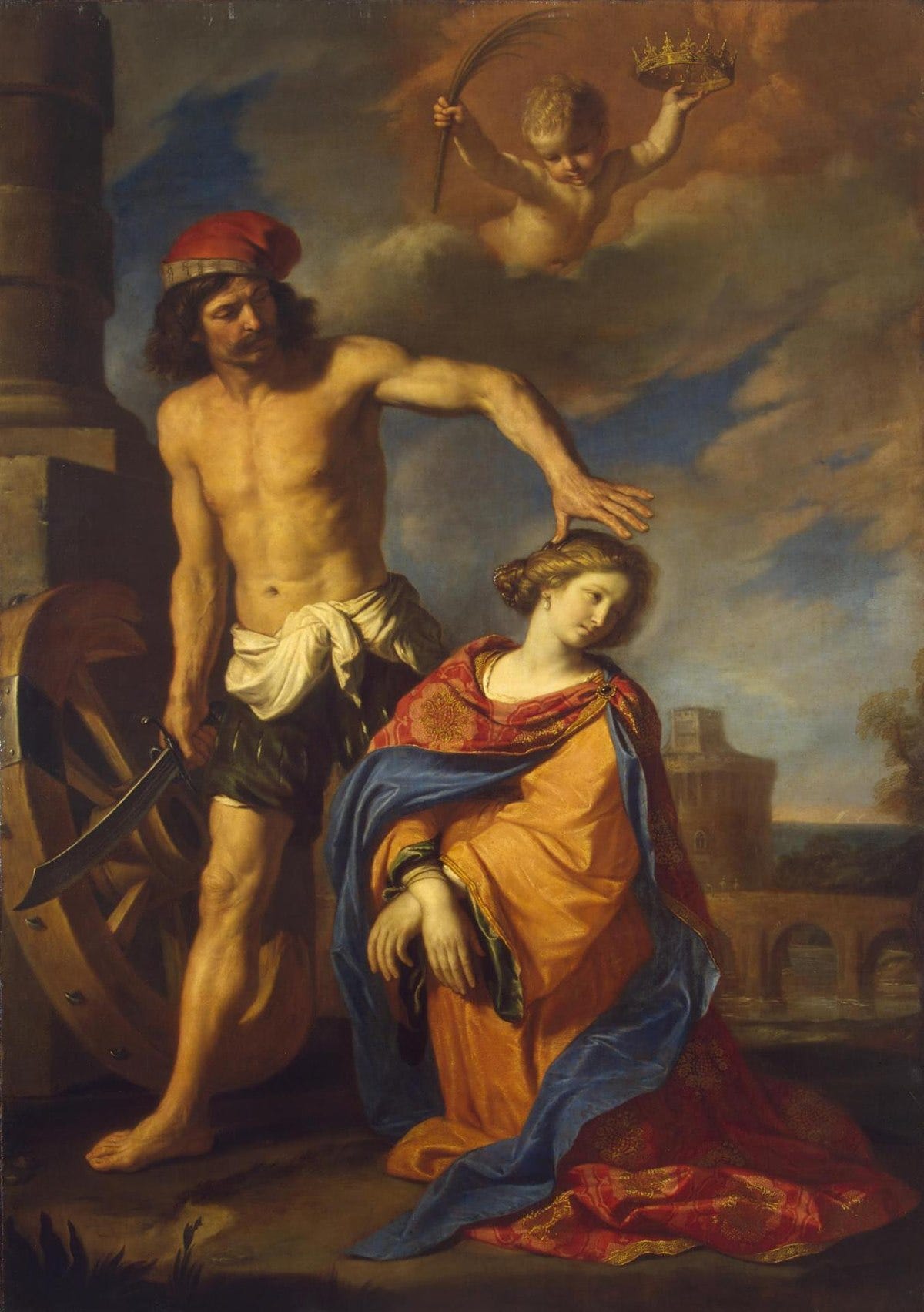
Sect: And why shouldn’t Romans persecute Christians, who you admit are diametrically opposed to Roman traditional culture and religion and want to set it on its head? While the Christians recruited prostitutes and tax collectors and criminals to their cause, the religiously pious and good-natured people stuck to their gods in the face of civilizational decadence.
Factual Note: the Early Church was disproportionately nobility and aristocracy. Not that everyone was some sort of duke, but the idea that Christians were exclusively a mob of slaves and hookers is wrong.
After all, the nobility were the only ones that were capable of really effecting change in this era. Early Christians needed the patronage of the wealthy and influential to first keep the Church afloat, and later exert influence to stop the slaughter. And then, get it legalized.
I’m sure there were lots of the refuse of society too, it’s hard to determine exactly the ratio was except we know from primary and secondary sources that the congregation skewed wealthy and influential.
This coincides with how we know New Testament Christianity spread: through the cities as the result of the patriarch of the family converting and the rest of his family following. Sometimes, the wife converted first and convinced him. But, this was also a time where you could have a chance of walking down the street and seeing a miracle being performed, which I assume lead to many impromptu conversions.
Quick note: Christianity was not “diametrically opposed” to Roman culture. After all, it was propagated by either Roman citizens or people living in the Empire. Instead, it opposed Roman religion, which is but one aspect of culture. In fact, Roman culture informed much of the New Testament Christian practices. Ask fanatical prots if they see too much or not enough Roman influence in the Catholic church. Christianity assimilated the “best practices” of the Roman culture with some degree of respect and admiration. The religion is a separate matter. Even still, we see stuff like the “virtuous pagans” making it into Paradiso anyway in the Divine Comedy, despite not being Christians.
Also, as stated above, there weren’t that many pious pagan people by this point. There certainly weren’t in the far regions of the Empire where New Testament Christianity began and the Imperial cult and pantheons were exotic ideas of far away rulers they’d never even seen. This raises an important question: Were the early converts Romans or not? It seems that there is a double standard here again: anyone who resisted was a pious ethnically Italian artistocrat that just happened to be stationed on the Roman equivalent of the ISS. Anyone who did converted was a filthy, swarthy Levantine slave that simultaneously was an ethnic outsider but also betraying the gods of the Roman people.
Obligatory reminder that the indigenous religion of the place where New Testament Christianity started was NOT the Roman pantheon (In fact, it was Christianity!) . The Romans did little proselytizing, but they did displace the indigenous religions of people they conquered with their own (mostly agnostic) civic religion. I thought that was subversive? Le sigh..
The typical Pagan view of history (Not necessarily Sect’s) is that everyone should hold still and change as little as possible for eternity because if you do anything, that’s subversive. Well, unless you’re putting various white peoples into the meatgrinder through wars of aggression, which is actually trad and based. But when you’re done, you have to hold still for eternity again.
The only way out of this conundrum is to acknowledge the validity of various nomadic, invasive peoples. But, this is a catch 22 because there’s no way to rectify why it’s okay for one group of whites to liquify white culture and history unprompted, but not okay for another group to dutifully pay taxes to white people while they sing unauthorized songs in their own homes.
Also, I wouldn’t say they “stuck to their gods” too much because the reason New Testament Christianity didn’t spread faster wasn’t “opposition” as much as it was hard to spread much of anything in the Ancient world. When people encountered early New Testament Christianity, they typically converted en masse. The problem was encountering it in the first place in a world where the Apostles either had to walk to their destination or take a sailboat or something. There wasn’t an effective alternative offered by the decaying, lifeless indigenous religion.
As Edward Gibbon said: Paganism couldn’t survive the “intolerable zeal of Christianity” because it was imbued with the “mildness of antiquity” (lmao)
Also also, the pagans were the ones that were decadent by this point. There was no Christian civilization to be decadent in the first place. If anything, the rise of Christianity was an indicator that pre-Christian pagan society was beginning to buckle with serious indications that it would not recover.
There’s some more flowery language here that I don’t like. Who determines what being good-natured is? I’d say someone singing Psalms on their way to their execution for the ancient equivalent of jaywalking is pretty good natured.
Thought experiment: what if 30 heavy cavalry Christian retainers swooped down and executed the Romans that were about to do this, Vitalist or subversive? What if it were 30 Romans saving a Consul?
Sect: Christians were obviously being encouraged to identify with the Israelites over their own ancestors, and to view their ancestors as akin to the enemies of the Israelites. So they were encouraged to destroy what remained of the world their ancestors built. They were also operating on heavy resentment for the people who had perfectly rational reasons not to like them in the past. It was an act of revenge just as BLM today seeks vengeance because we taught their ancestors to eat with a fork and knife. You see this later on too, among the Anglo-Saxons missionaries would paint Christian Anglos as Israelites and their ancestors as enemies of Israel.
Perhaps Sect should re-read my post (erm.. DIRECTLY addressing him) about how Jesus did not teach Christianity was only for the Jews. “Israel” was a proper ethnic nation in the Old Testament. They perform a duty similar to Noah’s Ark: stewarding Christianity in a world that is hostile to it and would remain so for millennia. Well, they don’t really do a very good job of it. In the New Testament, Jesus and the Apostles (including Paul) are explicit that the Children of Israel (As in, the ethnic Israelites) are no longer the sole stewards of this gift. They got first dibs, and some honor for housing the bloodline of Jesus, but the gift was opened up to the entire world. Go read the post I cited at the start of this paragraph for the in-depth explanation.
When WASP missionaries mention Israel, whether they realize it or not, they are referring to this “New Covenant” with the world.
Note: the British Israelites are a separate, interesting case where they believed that the Ancient Israelites were ethnically British. As in, Moses looked like your average Humbert Wilbertshire. I don’t think that is who Sect is referring to tho.
Once you realize that, this entire paragraph begins to unravel. So too does the silly idea that White Christians were told to side with “desert dwelling Semites” over their own flesh and blood or whatever. Another contradiction: that Christianity is a de-racinated “everyone is equal” religion, but also that Christians are to show favoritism to a specific ethnic group (the Jews) above their own.
Also, if the Early Christians received orders to destroy their Ancestor’s world then why did they… typically do the exact opposite of that?
Lastly, I wouldn’t pick a fight about who is more civilized.. especially considering it took toppling the indigenous pagans to fully figure out what “civilized” means in the first place.
Sect: The use of martyrdom to allegedly garner sympathy, gaining traction through gibs to the poor, and heavy in-group networking to bribe politicians and whatnot heavily are also things we see today as very Jewwy and left-Machiavellian
The number of Early New Testament Christians that sought martyrdom to their own detriment was not that high. High enough that several councils basically told them to knock it off, but not enough to threaten the overall survival of the movement or whatever.
Martyrdom, religion aside, is an excellent recruitment tool. We just re-learned this lesson in trying to “bomb our way out of an insurgency” in the Middle East. You can’t drop enough bombs, or make enough martyrs, to put a movement down. In fact, it always has the opposite effect. Acknowledging a sociological response to certain.. erm.. stimuli.. doesn’t make a movement any more or less “jewwy” than does acknowledging gravity.
The rest of this, I’m afraid, is boilerplate “heads I win, tails you lose” tactic I see a lot from pagans. They want to engage in this mighty struggle for civilization… as long as they win. Asking people who were already being hunted down to stop doing things like networking is silly. Categorizing almsgiving as gibs is silly. Asking people you are trying to atomize to fight (love) with one hand behind their back is silly. This is the equivalent of asking your boxing opponent to “hold still so I can punch you”. Actually tho. “Ok I get to looney-tunes execute any of you guys that I catch without provocation or reason, but if you do anything to resist this its subversive and Jewwy”. Lol.
The idea that there was a “Christians vs Pagans” war is also quite silly and a very one-sided view of history. For the most part, New Testament Christians wanted to be left alone. That is why Paul tells them to not give the Roman government a reason to slaughter them. Note the absence of a “playbook” to writhe into power or out-Jew the Romans. What is Paul supposed to do, stop the nobility from feeling a call to be Christians because it wouldn’t be fair?
Sect: And frankly, I am yet to see evidence that martyrdom actually played a large role in the spread of Christianity. It is clearly one of the stupidest things Christians do, literally asking to be killed. This is suicide by any other name. Maybe it played a small role but clearly these other factors like networking and charity to the poor were more impactful on society.
Like I said, this is settled science. There is something inspiring to the human brain about watching someone authentically die for their beliefs. It’s quite clear that the martyrs were some of the most “effective salesmen” to bystanders, onlookers, or those curious already about Christianity. It was the ultimate demonstration that it wasn’t just a club, that it was “for real” and that Christians literally and authentically believed what they preached.
Emperor Julian certainly thinks so:
Equating suicide to martyrdom is quite dastardly. Suicide is an inherently selfish, final act of defeatism. Martyrdom demonstrates a meek strength beyond strength, that one is brave and not scared of what will happen to them. It shows that the Christians were truly committed to living like Christ, even if that meant dying like Him.
Of course, there is the practical reason that there was no way to “organize” and prevent martyrdom through force in that time. Of course, the tables would turn a few centuries later and the Christians would get their turn making many martyrs.
Teehee.
It should be noted that there are zero records of recounting Early Christians (that survive, anyway) but many tens of thousands of pagans that became Christians rather than die. What does that say about the ferocious Northwestern European warriors (that many pagans claim only nominally converted to spare their lives) while Christian women dutifully went to their deaths? Btw, I doubt the Gallic warriors that refused did so on religious grounds, more so practical reasons. Maybe something to do with honor, knowing that they would be lying and it was just a way to duck their fate.
Either way, equating self-sacrifice in an ultimate demonstration of sincere, deep love to your God to blowing your head off because you gambled on the stock market (or lost WWII) is devious. This is like equating a poptart to an apple because they both contain fruit. One is triumphant, the other is the ultimate symbol of cowardly defeat and completely broken mental and spiritual faculties. Except when Hitler does it, then it’s fine. Apparently.
Read more about why I hate suicide here.
To traditional societies, the greatest thing is heroic virtue, not martyrdom. They’re almost polar opposites.
Note that in 2024, “traditional” means Christian in Europe. There’s no pagan tradition left, nor will there likely ever be again.
To Pre-Christian societies, suicide was seen as one tool used to deal with their problems. Lots of people committed suicide in the Ancient world. It was an accepted tactic, sometimes even an expected outcome of a failure. I take it Bagans have no qualms with practices like decimating armies. Are the decimated soldiers martyrs, or did they commit suicide? If they resisted, would they be subversive Jews?

I agree that suicide is bad. I think your job is to argue that it’s actually based because the Romans and Greeks did it.
Bonus Round: Evidence that New Testament Christians Did Not Holobunga Pagans.
Everything I’m about to write is either a direct quote or summarization of Dr. Rodney Stark’s prolific The Triumph of Christianity Chapter 11: The Demise of Paganism. TLDR: Paganism was not destroyed but rather slipped away into obscurity over centuries.
This book is essential reading.
Point #1: If Pagans were persecuted, why is there so much Pagan representation in the Constantine era Empire?
Consuls and Prefects in the reigns of Emperors by Religion:
The Bishop of Ravenna during the 440s laments (yet tolerates) princes dressing up like pagan gods and celebrating in full costume in the Hippodrome
Point #2: If Pagans were persecuted, why did Christians leave Pagan institutions intact for so long?
The (pagan) Academy in Athens didn’t even close until 529
Pagans in Edessa still sacrificed to Zeus up until the 570s
“There were many active pagans and functioning temples to the gods in Greece and further east as late as the tenth century”
Various incorporations of pagan traditions (holidays, sacred wells, etc) incorporated by Western Christians that also allegedly hated and wanted to liquify pre-Christian religion.
Conclusion
Hopefully, I’ve set the record straight. I probably won’t revisit this topic for engagement purposes and I’m growing bored of it. Here’s the takeaway FACTS!! from the discussion:
Pagans never received poor treatment in kind to what they gave the Christians. They merely “slipped out of history” through very tolerant treatment. This weakens the case that Christianity was some sort of guerilla war against Whiteness or whatever.
Christians rarely destroyed pagan cultural media for the sake of piety, but rather because of the specific connotation individual pieces of art had to their mistreatment.
Christians did a remarkable job of preserving antiquity, often from antiquity itself.
Early New Testament Christians are disproportionately nobility, although there were certainly a fair share of bottom feeders.
There was effectively zero “jewwy writhing into power” until after the early Church had converted the Empire.
I should note that my buddy Sect is a very smart guy who has a very good grasp on global history. So while I think he is misled on this topic, I wouldn’t say he’s dumb or something. In fact, he probably has a better overall knowledge of things than I do. Like, in terms of raw memory recollection for trivia or even most quantifiable forms of intelligence. That doesn’t mean I won’t square off with him on topics such as these. Or.. go band for band…
Fin.




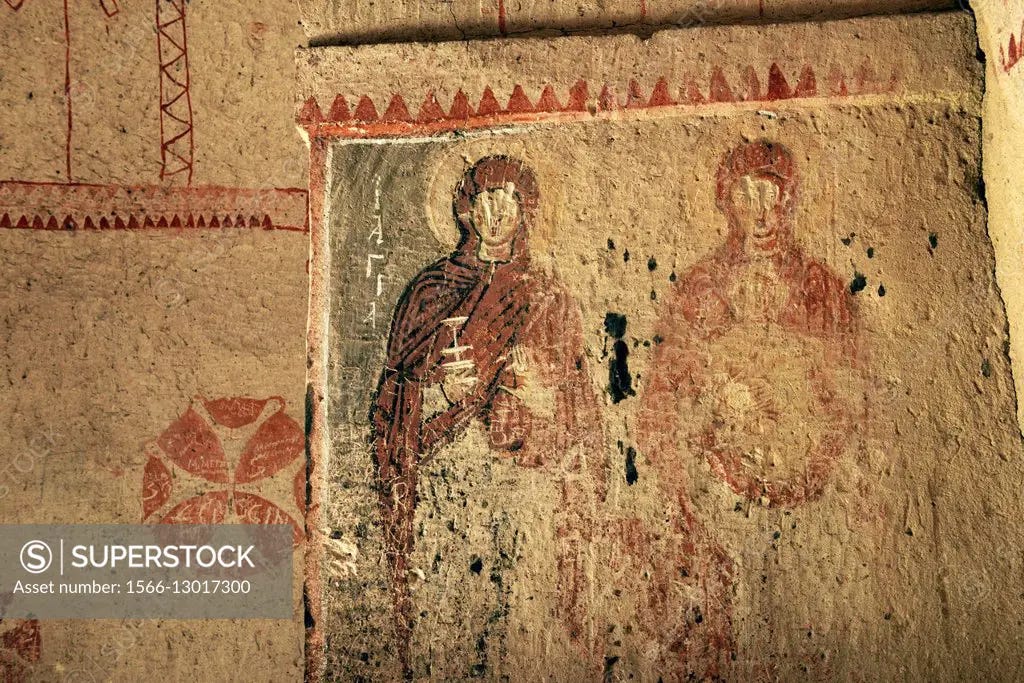
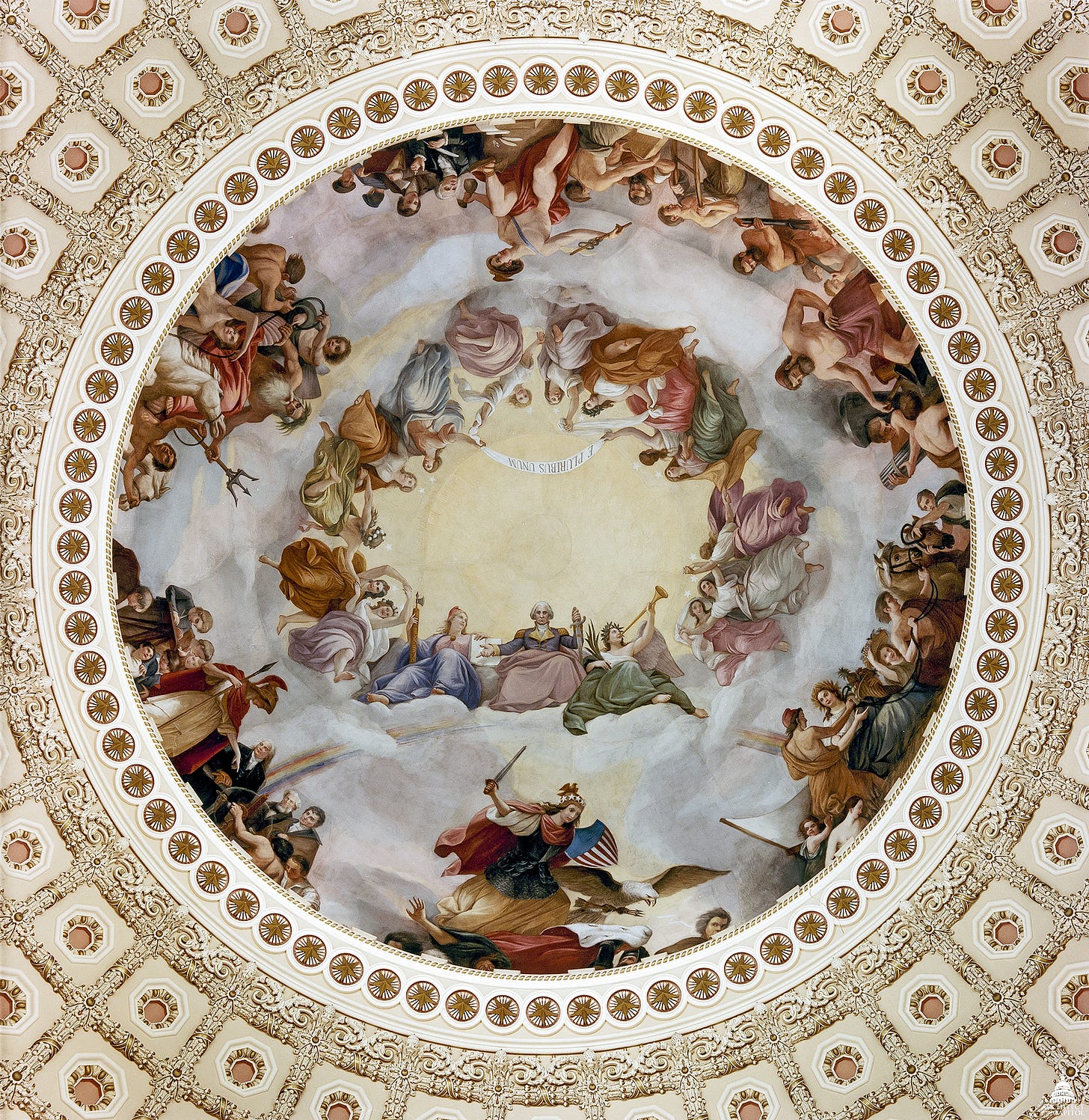


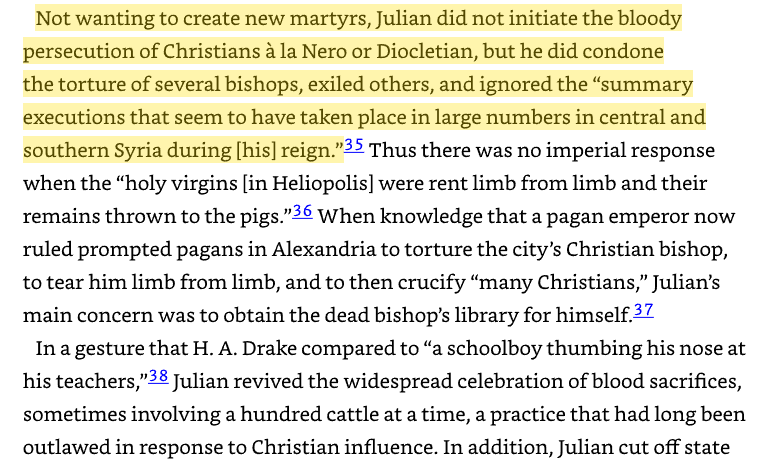
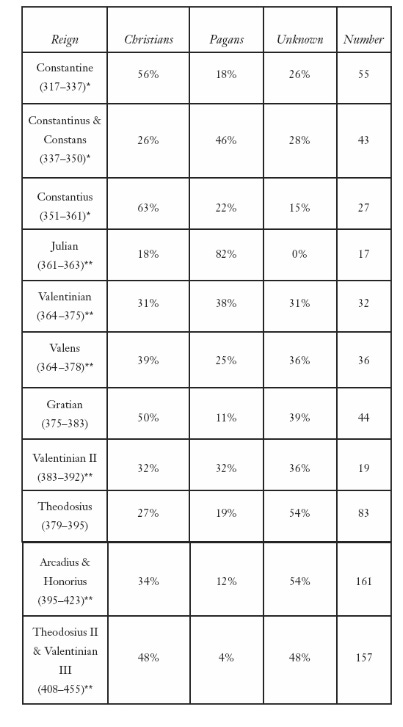


Seeing my old oomfies going gyatt for gyatt got me going rizz for rizz 😔✊🏻
On sectionalisms point about Christianity getting people to associate themselves with Israelites. Byzantines recited stories of Roman hero’s, bishops, referenced them in their speeches, and the Byzantines openly suppressed the Israelites so much they betrayed Byzantium by throwing open the gates to cities for Persian invaders (Persians who would later be killed by a blonde Christian warrior-king, Heraclius). If Christians did try this, it clearly didn’t succeed, even in the East, even where people were so rabidly Christian discussing theology (and fighting about it) was a common pastime.